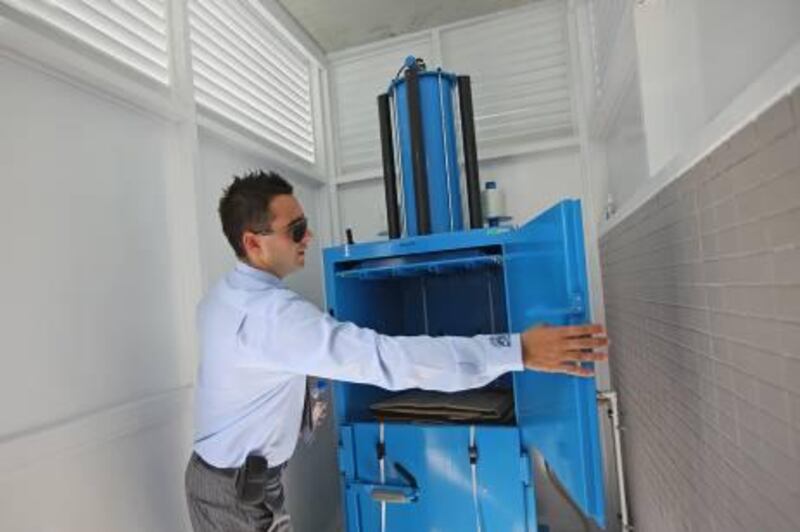DUBAI // It sounds like the ultimate environmental oxymoron: a green petrol station.
After all, the fumes released by engines burning petrol and diesel cause the air pollution that is largely to blame for climate change.
But officials at the Emirates National Oil Company (Enoc) are not hung up on the phrasal contradiction. Yesterday, the company showcased its new green petrol station - with environmental upgrades worth about Dh3.6 million - to reduce the company's impact on the environment.
The new station, located in The Meadows, part of Dubai's Emirates Living residential area, is fitted with noise reduction barriers and a system that collects the harmful vapours released from fuels, as well as solar lights, water recycling and other "green" features.
"There is a mindset that oil companies are polluting companies and are not responsible," said Zaid al Qufaidi, the head of the retail business stream of Enoc/Eppco. He said he hoped once motorists became aware of the technologies on the site, perceptions would change.
"As a company with over 30 subsidiaries and more than 6,000 employees, we believe our actions have a direct impact on the community and the environment," said Saeed Abdullah Khoory, the chief executive at Enoc.
While it cost about Dh18 million to build a traditional station of this size, Mr al Qufaidi said, the clean technology investment came with a 20 per cent increase in cost. And it took a year to source the technologies and implement them on site.
"This is our little contribution to the community," Mr al Qufaidi said. "We are already testing different initiatives in different stations, but this is the first time we are integrating all these technologies in one location."
Among the most important technologies is a €140,000 (Dh680,000) system to collect the vapours released as petrol is loaded into the station's main holding tanks, and later into vehicle fuel tanks. Although these systems are the norm in European countries, they are not required by law in the Gulf, and only three other petrol stations in the region have them.
"Liquid petrol evaporates at low temperatures as soon as it is moved," said Amer al Osh, the general manager of TST Electronics in Dubai, which provided the vapour collection system.
As a car is refuelled, vapours in the fuel tank escape into the atmosphere. These vapours contain toxic volatile compounds that are harmful to people and the environment.
On calm, sunny days, these compounds react with other pollutants to form smog, known to scientists as ground-level ozone.
Repeated exposure to smog can increase the risk of respiratory infections in healthy people as well as aggravate pre-existing conditions like asthma. Ground-level ozone also has strong global-warming potential.
About 0.5 per cent of pumped fuel evaporates at a temperature of 40°Celsius, according to Mr al Osh.
"We take the vapour back," he said, explaining that about 99 per cent of these emissions were saved. Once it is collected, the vapour goes into a central underground tank, where it is put under pressure and liquefied into fuel again.
The petrol station serves 550 customers and uses an average of 65,000 litres of fuel a day. The system has been under testing for two months at The Meadows petrol station and has already saved 22,000 litres of fuel.
The station is the first in the Gulf to have noise reduction barriers, a feature of particular importance considering its location in a residential area, said Mr al Qufaidi.
"While I was visiting Europe, I noticed they had sound barriers along the highways," he said. "Since then, I always wanted to have a similar technology in our stations, especially in residential areas."
The petrol station also has a system that recycles water from its car wash, making it more efficient than traditional car wash facilities. As vehicles are washed, the water - rather than going in the sewage network - is collected in an underground tank and purified so it can be used again.
To increase energy savings, the facility uses light emitting diodes (LED), which are several times more efficient and last longer than traditional lights. Finally, outdoor lights and signs are powered by solar panels.
Green features
The Enoc petrol station uses 30 green tactics, including:
• A vapour collection system to trap toxic fumes that escape when fuel is loaded into the station’s main storage tanks, or into the fuel tanks of individual cars
• Sound reduction barriers to prevent noise pollution in the surrounding residential area
• A water recycling system at the car wash that allows waste water to be re-used
• Solar-powered lights and signage to reduce energy usage
• LED lights to reduce energy usage
• Recycling bins for residents





